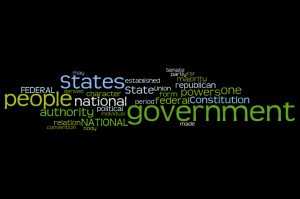One of the most important issues during the debate over the ratification of the Constitution was the question of where and how power would be allocated. In Federalist No. 39 James Madison articulated the Federalist view that the new nation would be a combination of federal and national power. This essay was meant to assure doubtful Anti-federalists that the new government was not taking power away from individuals or from the separate states. On the other side of the debate, the fiery, Virginian Antifederalist Patrick Henry delivered a speech on June 7, 1788 that questioned whether the new central government was really just consolidating power for itself.
Madison’s essay most prominently features the words ‘government,’ ‘states,’ ‘people,’ and ‘national.’ This word selection is representative of Madison’s point that the states and the national government will both have power under the new Constitution. Madison begins by trying to explain the Constitution’s Republicanism as a mix of powers between the national and state governments. Maintaining that the power lies with the people, Madison claims that the Constitution is “in its foundation it is federal, not national,” and is in practice “partly federal and partly national” (Federalist 39). The House of Representatives will derive its power directly from the people, making it a national, not federal, organization. On the other hand, the Senate is elected by the states, making it federal and not national. The presidency “will be derived from a very compound source…presenting at least as many federal as national features” (Federalist 39). Beeman also touches briefly on Madison’s advocacy of this duality, reminding the reader that the essay was at heart both “high-minded theory and political propaganda” (Beeman 407). When looking at the Word Cloud, one should notice that the words ‘federal’ and ‘national’ are represented twice, so keep in mind that these words are actually featured much more prominently than they appear to be.
Madison’s frequent use of the words ‘powers’ and ‘authority’ shows that his emphasis is on these factors and how they will be distributed. A common Antifederalist argument that came from the lower and middle classes was that power and authority would be invested in an aristocracy of a few powerful, wealthy men. The Federalists presented the counterargument that this ‘aristocracy’ would be “both an aristocracy of power and an aristocracy of merit,” ensuring that any citizen could wield power (Cornell 1158).
Patrick Henry’s speech before the Virginia ratifying convention was almost a direct rebuttal to Madison’s “Federalist No. 39,” claiming that the Federalists were leading people astray with false promises. In the Word Cloud, Henry uses the words ‘government,’ ‘people,’ and ‘power’ prominently, showcasing his concern with the new Constitution’s reassignment of powers. Henry articulately describes the Antifederalist view that the new central government will be taking power away from the people, compromising their safety and their rights. Ever a fervent Virginian, Henry uses the word ‘Virginia’ as much as ‘states’ and ‘American,’ and more than ‘union,’ ‘country,’ or ‘Congress’. Henry relied on Virginians’ pride in their sovereign state and their faith in their own Declaration of Rights when he questioned the centralization of power: “The founders of your own Constitution made your Government changeable: But the power of changing it is gone from you!” (Henry). Henry acknowledges that the government is capable of being influenced by the individual but he asserts that all of the people of the states will now be able to make decisions about Virginia with equal authority as actual residents of the state. The word ‘King’ also features in the Word Cloud, symbolizing another Antifederalist fear that power would be centralized in an uncontrollable authority figure all too reminiscent of a king. Henry specifically says that the Constitution “squints towards monarchy” and worries “how easy is it for [the American chief] to render himself absolute” (Henry).



Your house is valueble for me. Thanks!…